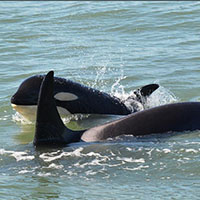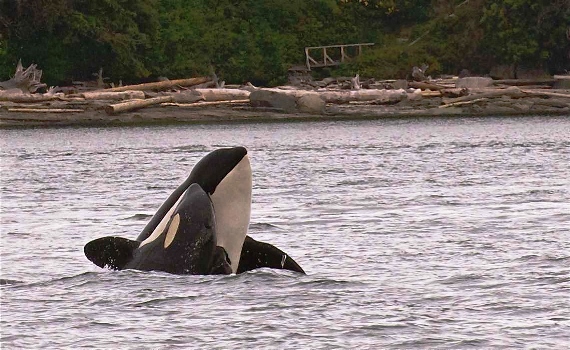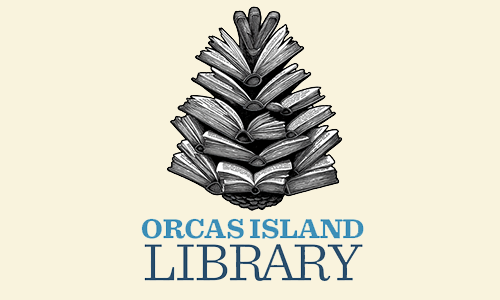— by Margie Doyle —
At the Aug. 2 Eastsound Planning Review Committee (EPRC) meeting, Toby Cooper addressed the county advisory committee and the public audience. He spoke movingly of the need for the EPRC and the public to address “the larger environmental question in both the US and Canada …to restore efforts to wild salmon.” Cooper spoke to the recent death of J 35 (Tahlequah’s) newborn, saying “Mothers don’t have enough food to eat…. We have got at least 5 more years of reproductive life in this population.”
He urged the meeting to consider “restoration of wild salmon as a priority. Something we can do at EPRC is live up to the 2017 vision statement to protect nearshore waters, spawning habitat for forage fish [for the salmon].
“We can do this; we just need to elevate the priority, and ask [EPRC Co-chair] Margaret Payne to report on the record at the Open Space committee for a role for EPRC action at its Sept. 6 meeting to propose to the county council.”
Payne agreed to place the matter on the agenda for the next Open Space committee meeting. Following Cooper’s comments, the group recommended following organizations such as:
- the Southern killer whale task force https://www.psp.wa.gov/southern-resident-orca-task-force.php , co-chaired by Stephanie Solien, vice chair of the Puget Sound Partnership Leadership Council, with State Senator Kevin Ranker, County Councilman Jamie Stephens and D. Joe Gaydos serving (next public meeting Aug. 28 at Swinomish Casino);
- and Long Live the Kings, https://lltk.org/fighting-for-our-orca-whales/
Eastsound has been scientifically recognized as one of the remaining healthy spawning grounds for Chinook Salmon, the orcas’ main food source. EPRC member Brian Wiese supported the advisory committee playing a role in addressing the problem and finding solutions, saying, “Saving the salmon is essential to our region.”
**If you are reading theOrcasonian for free, thank your fellow islanders. If you would like to support theOrcasonian CLICK HERE to set your modestly-priced, voluntary subscription. Otherwise, no worries; we’re happy to share with you.**









I’m sorry I had to miss the EPRC meeting and fully support these efforts to do all we can for the resident orcas; I hope enough fish can somehow be provided to get them out of this crisis of near-extinction. Part of a many-pronged approach may mean a moratorium allowing any boats to chase and surround orcas and giving them a break from all the noise. It should also include trying to effect changes with the Navy. Some in the whale-watch industry respect the distances and some do not. The County needs to fine those who don’t respect the orcas that are starving and stressed.
Perhaps the whale-watch industries will voluntarily turn into something more education -oriented that helps to raise money for saving these amazing resident orca whales that have helped thesse companies to prosper for so many years. It hurts economically, but doing the right things seems to be paramount, if any orcas are to survive. We must have enough footage and photos of these beautiful creatures that we can open a whale museum or educational place on each island, educate the tourists, who I am certain do not want to add to the harm of these creatures for the selfish experience of seeing them “up close and personal.”
Limekiln Park has always been a lovely place for viewing orcas – when they choose to present themselves to hopeful viewers. When they do, it’s a great gift. Chasing them is, in my mind, at this time of their near-extinction, akin to harassment. I’m sure that nobody really wants to contribute to the orcas’ demise. I hope we can form concerted efforts to help the resident orcas without so much interference with them, and deal with the immediate problem at hand – lack of salmon and a polluted and noisy Salish Sea.